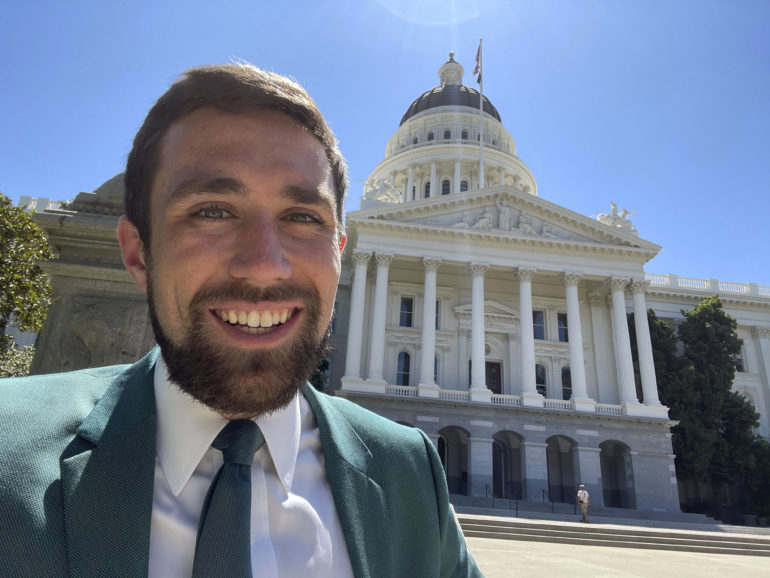Last year at this time, Kevin Paffrath was focused on his YouTube channel, where his half-million-plus followers could tune in for daily commentary on housing, stocks and stimulus checks. It earned him nearly $10 million over the last 12 months.
Now, the 29-year-old former real estate broker is following Gov. Gavin Newsom around his home state. It’s the best way he can think of to draw attention to his unlikely effort to replace Newsom in the upcoming recall election on Sept. 14.
Paffrath is a registered Democrat and self-declared centrist who voted for Joe Biden in the 2020 presidential election. While he’s highly critical of Newsom and says he’s been a “failed leader,” Paffrath is equally concerned that the Democratic Party has no emergency plan.
Should more than half of California voters support the recall on their ballots, the next governor would be whichever of the 46 successor candidates gets the most votes, making it much easier for an outsider to win. Paffrath is one of the nine candidates listed as a Democrat, but party leaders are urging a “No” vote to the recall effort and saying voters should skip the second question asking who should be governor if the recall succeeds.
“It was mind-blowing to us that they didn’t put at least somebody in, so that way, worst case, they had a hail mary,” Paffrath said in an interview on Friday over a coffee, after attending a Newsom press event in San Francisco.
In an early August poll by Survey USA, Paffrath had the most votes in the field of replacements, with 27%. The next six candidates are all Republicans, including conservative talk show host Larry Elder and reality TV star and former Olympic athlete Caitlyn Jenner.
“We think in the last two weeks of this campaign if the recall looks more and more likely, the Democratic party will be forced to pick a Hail Mary back-up candidate,” Paffrath said. “Given that we’re No. 1 in the polls, we hope that’s us.”
Democrats are right to be nervous.
A poll conducted by the University of California, Berkeley, and the Los Angeles Times in late July showed 51% of registered voters opposed the recall, with 36% in favor. But among likely voters, the gap favoring Newsom’s retention narrowed to three percentage points.
The anti-recall movement has raised about $51 million, almost eight times as much as the side trying to oust Newsom. Netflix CEO Reed Hastings has contributed $3 million in support of the governor.
Donors can contribute an unlimited amount for or against the recall, but only up to $32,400 in support of any specific replacement candidate. Paffrath said he’s raised close to $400,000 and has put in about $200,000 of his own money. The average donation is $70, he said.
“We don’t have the war chest that Newsom does, so we have to do everything in our power with grassroots and social media,” Paffrath said.
For example, Paffrath paid his brother-in-law, an app developer, to build his “Meet Kevin” app. And he’s trying to get in front of the media as much as possible. Most of his ad spending is via text message to let voters know there’s a Democratic alternative.
On Friday, Paffrath hung out outside Manny’s restaurant in San Francisco as Newsom spoke inside to the press. Dressed in a navy suit with a purple tie, Paffrath made himself easy to spot for reporters. He said he’s careful not to be disruptive at the events.
“We have to combat, this ‘Oh yeah he’s a YouTuber, he’s a prankster,'” Paffrath said. “We stand there very respectfully and reporters recognize us. They talk to us.”
From San Francisco, he’s following Newsom to Los Angeles and San Diego, and possibly beyond.
How it started
The recall effort picked up momentum during the pandemic as frustration mounted about the state’s shutdown of schools and small businesses, and the slow pace of the reopening even as Covid-19 cases and hospitalizations plummeted.
Newsom critics pounced at the opportunity to highlight the worsening homeless problem and increasing crime rates while taxes and living costs remained among the highest in the country. Paffrath said he wasn’t an initial proponent of the recall and didn’t get involved until it was well underway.
“The reason I think folks are frustrated is we pay our taxes, then we look up to see what our government is doing for us with the services we’re paying for,” he said. “And we see people dying on the street. We see blight. That’s why people are leaving.”
Paffrath, who lives with his wife and two young sons in Ventura, about 70 miles from Los Angeles, has made addressing the homeless issue his top agenda item. His proposal is to build new emergency facilities and lease commercial and office buildings, including many that have been vacated during the pandemic, to set up mass spaces with cots and small rooms, supported by staffing from the National Guard.
His aim is to get all of California’s 160,000 homeless people off the streets in 60 days at an eventual cost of $10 per person per day, covering food, medical support and bathrooms.
Paffrath has equally ambitious — some may say outlandish — goals for new types of “future” schools, a system of underground tunnels to alleviate traffic problems and the building of Las Vegas-style casinos as part of a plan to fully legalize gambling.
He also recognizes the existential threat posed by fires and droughts. He advocates spending on controlled burns and a pipeline from the Mississippi River to double water flow to the Colorado River. When it comes to solar plants, he wants to incentivize companies to stay in California rather than going elsewhere.
“I’m tired of hearing about Tesla building solar panels in New York and Nevada,” he said. “Those should be in California.”
$10 million on YouTube
Paffrath’s fans are used to hearing him opine on such matters. He now has almost 150,000 Twitter followers and 1.7 million on YouTube. Regular topics include interest rates, the crypto economy and politics.
Paffrath got his start in real estate a little over a decade ago by teaching people how to invest in the market. He became a broker and started buying property, then took his teaching experience and market knowledge to YouTube. By 2018 was making enough money — a couple thousand dollars a day — to let his broker license expire and to get out of sales.
At the coffee shop on Friday, he pulled out his phone and navigated to his YouTube earnings dashboard. Over the past year, the page showed, his ad revenue on the site topped $3.5 million. Affiliate revenue and money he makes from courses on building wealth brought in an additional $6 million or so, he said.
But his focus now is on politics. Paffrath said he’ll run in 2022 even the recall is unsuccessful or if another replacement candidate wins. That’s as far out as he’s projecting.
“I don’t want to be a career politician,” he said. “I want to fix California.”
He also wants to assure Democrats that he’s not just using their party label because it gives him the best chance to win. With a legislature that’s three-quarters Democratic, he said it’s important to start on things that the majority cares deeply about, like the homeless problem.
Control of the U.S. Senate could also be at stake. Dianne Feinstein, the state’s senior senator, is the oldest member of the chamber at 88. She’s not up for reelection until 2024, and questions have been swirling around whether she’ll retire before then.
If so, the governor would get to pick her temporary successor. The Senate is currently at a 50-50 split, with Vice President Kamala Harris in position to cast deciding votes when needed.
Paffrath made it clear he would pick a Democrat.
“I’m not going to burn the party,” he said. “I don’t want people to think that just because I’m a recall candidate I’m going to go in there and do what Republicans say they want to do, start cutting things and throwing around the furniture. It’s not going to work. You’ve got to respect the legislature.”
WATCH: California Gov. Newsom faces recall



